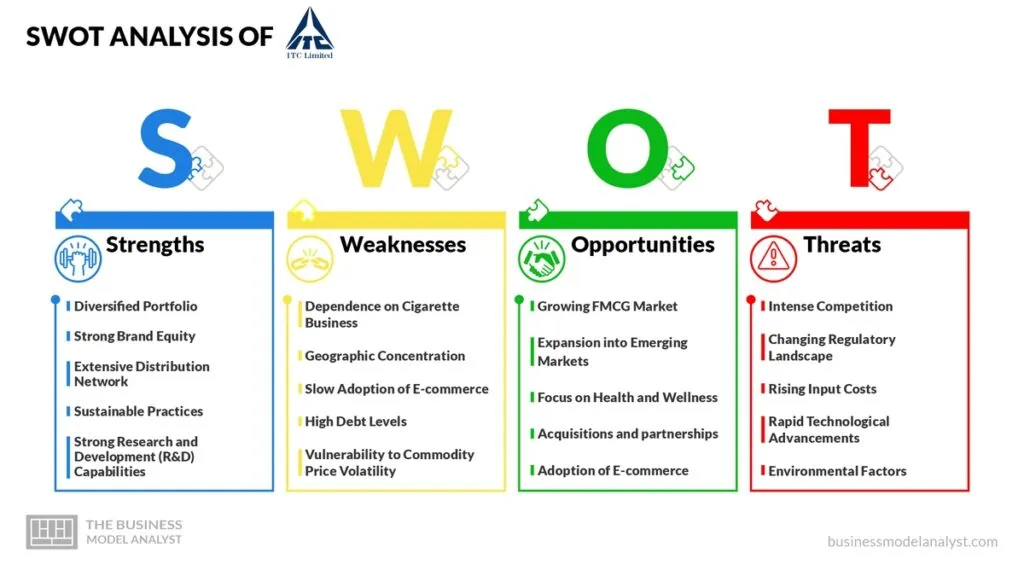ITC SWOT Analysis encompasses a comprehensive assessment that examines the strengths, weaknesses, opportunities, and threats faced by ITC Ltd, a leading Indian conglomerate that operates in diverse sectors.
The company was formerly known as the Imperial Tobacco Company of India Limited. It is based in India, and it has established itself as a powerhouse in multiple industries by being a significant player in sectors, such as fast-moving consumer goods (FMCG), agribusiness, hotels, paperboard, and information technology.
ITC Ltd’s operations span across India and extend to various international markets. In India, the company has a widespread presence, with manufacturing units, offices, and distribution networks strategically located across the country. ITC’s international footprint includes a global agribusiness presence, with exports of agricultural commodities to numerous countries. Additionally, ITC Hotels cater to both domestic and international tourists, offering unparalleled hospitality experiences.
ITC Ltd traces its origins back to 1910 when it was incorporated as the Imperial Tobacco Company of India Limited. At the time, its primary focus was on manufacturing and marketing cigarettes, catering to the growing demand in the Indian market. The company established its first manufacturing facility in Munger, Bihar, and quickly gained a reputation for producing high-quality tobacco products.
Recognizing the need to diversify its operations and reduce dependence on a single industry, ITC Ltd embarked on a journey of expansion into new businesses. This strategic move aimed to leverage its resources, expertise, and brand equity to venture into sectors with promising growth potential. Over the years, ITC Ltd successfully entered several industries, expanding its footprint and establishing itself as a diversified conglomerate.
One of the key areas where ITC Ltd made significant strides is the fast-moving consumer goods (FMCG) sector. In the 1970s, the company ventured beyond tobacco and entered the FMCG market with the launch of its personal care products under the brand name “Essenza Di Wills.” This foray marked the beginning of ITC’s journey into non-tobacco consumer goods.
In subsequent years, ITC Ltd expanded its FMCG portfolio, introducing a range of products across categories such as food and beverages, personal care, education stationery, and safety matches. The company’s FMCG division witnessed exponential growth, fueled by its commitment to quality, innovation, and consumer-centric strategies. Today, ITC Ltd’s FMCG brands, including Aashirvaad, Sunfeast, Bingo!, and Yippee!, are household names in India and enjoy a significant market share.
ITC Ltd recognized the importance of building a robust supply chain and ensuring sustainable sourcing practices. In the early 1980s, the company entered the agribusiness sector, focusing on agricultural commodities such as wheat, rice, leaf tobacco, and coffee. With a vision to create a more inclusive and sustainable agricultural ecosystem, ITC Ltd implemented farmer empowerment programs, promoting responsible farming practices, and enhancing the livelihoods of farmers across the country.
The company’s agribusiness division handles the sourcing, processing, and exporting of agricultural commodities. ITC Ltd’s efforts in this sector have not only strengthened its supply chain, but also contributed to rural development and the overall growth of the agricultural industry in India.
In the late 1970s, ITC Ltd made its entry into the hospitality industry with the launch of its first luxury hotel, the ITC Maurya, in New Delhi. This marked the inception of ITC Hotels, a chain known for its opulence, exceptional service, and commitment to sustainability. Over the years, ITC Hotels expanded its presence across major cities and tourist destinations in India, offering a unique blend of traditional Indian hospitality and contemporary luxury.
ITC Hotels has been a pioneer in sustainable practices, emphasizing environmental stewardship and social responsibility. The chain has received numerous accolades for its initiatives in energy conservation, water management, and community development, making it a preferred choice for environmentally conscious travelers.
From its humble beginnings as a tobacco company, ITC Ltd has transformed into a diverse conglomerate with a remarkable presence in various industries. In this article, we will be examining the internal factors that empower ITC and the external elements that pose challenges. This SWOT analysis will help to shed light on the company’s current standing, growth potential, and strategic implications, allowing stakeholders to gain valuable insights into its prospects.
Contents
SWOT Analysis of ITC
ITC Strengths
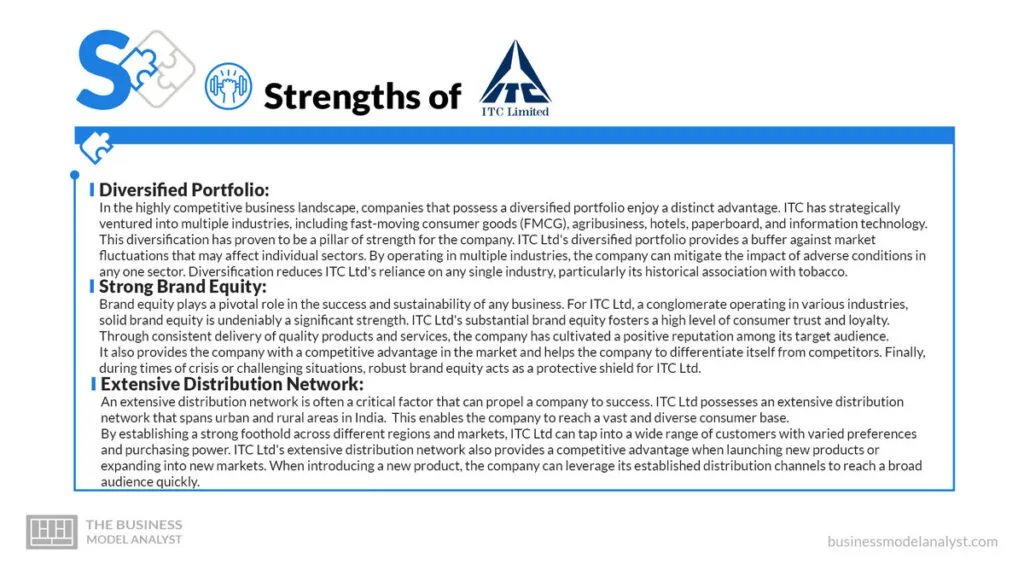
The following are the strengths that have helped ITC remain in business for over a century:
- Diversified Portfolio
In the highly competitive business landscape, companies that possess a diversified portfolio enjoy a distinct advantage. ITC has strategically ventured into multiple industries, including fast-moving consumer goods (FMCG), agribusiness, hotels, paperboard, and information technology.
This diversification has proven to be a pillar of strength for the company. ITC Ltd’s diversified portfolio provides a buffer against market fluctuations that may affect individual sectors. By operating in multiple industries, the company can mitigate the impact of adverse conditions in any one sector. Diversification reduces ITC Ltd’s reliance on any single industry, particularly its historical association with tobacco.
- Strong Brand Equity
Brand equity plays a pivotal role in the success and sustainability of any business. For ITC Ltd, a conglomerate operating in various industries, solid brand equity is undeniably a significant strength. ITC Ltd’s substantial brand equity fosters a high level of consumer trust and loyalty. Through consistent delivery of quality products and services, the company has cultivated a positive reputation among its target audience.
It also provides the company with a competitive advantage in the market and helps the company to differentiate itself from competitors. Finally, during times of crisis or challenging situations, robust brand equity acts as a protective shield for ITC Ltd.
- Extensive Distribution Network
An extensive distribution network is often a critical factor that can propel a company to success. ITC Ltd possesses an extensive distribution network that spans urban and rural areas in India. This enables the company to reach a vast and diverse consumer base.
By establishing a strong foothold across different regions and markets, ITC Ltd can tap into a wide range of customers with varied preferences and purchasing power. ITC Ltd’s extensive distribution network also provides a competitive advantage when launching new products or expanding into new markets. When introducing a new product, the company can leverage its established distribution channels to reach a broad audience quickly.
- Sustainable Practices
Companies are increasingly realizing the importance of adopting sustainable practices, as the business landscape changes rapidly. By integrating sustainability into its operations, ITC has shown its deep commitment to environmental stewardship, social responsibility, and ethical governance. The company has implemented numerous initiatives to reduce its ecological footprint and promote conservation.
These include energy-efficient operations, waste management programs, water conservation measures, and the use of renewable energy sources. Sustainable practices adopted by ITC Ltd often result in cost savings and improved operational efficiency. Embracing sustainability drives innovation and product differentiation for ITC Ltd. In conclusion, ITC’s sustainable practices not only enhance its brand reputation but also positions the company for long-term success in a rapidly evolving business landscape.
- Strong Research and Development (R&D) Capabilities
ITC stands out for its strong research and development (R&D) capabilities that help it stay ahead of the curve. The company’s R&D capabilities serve as a driving force behind product innovation. The company invests heavily in R&D activities to develop cutting-edge technologies, novel product formulations, and unique solutions that meet evolving customer needs.
Through its strong R&D capabilities, ITC Ltd focuses on enhancing the quality and performance of its products and services. Also, the company invests in patents, trademarks, copyrights, and trade secrets to protect its innovative technologies, processes, and formulations. In conclusion, ITC’s strong R&D capabilities foster market differentiation, nurture collaborative partnerships, and future-proof its business.
ITC Weaknesses
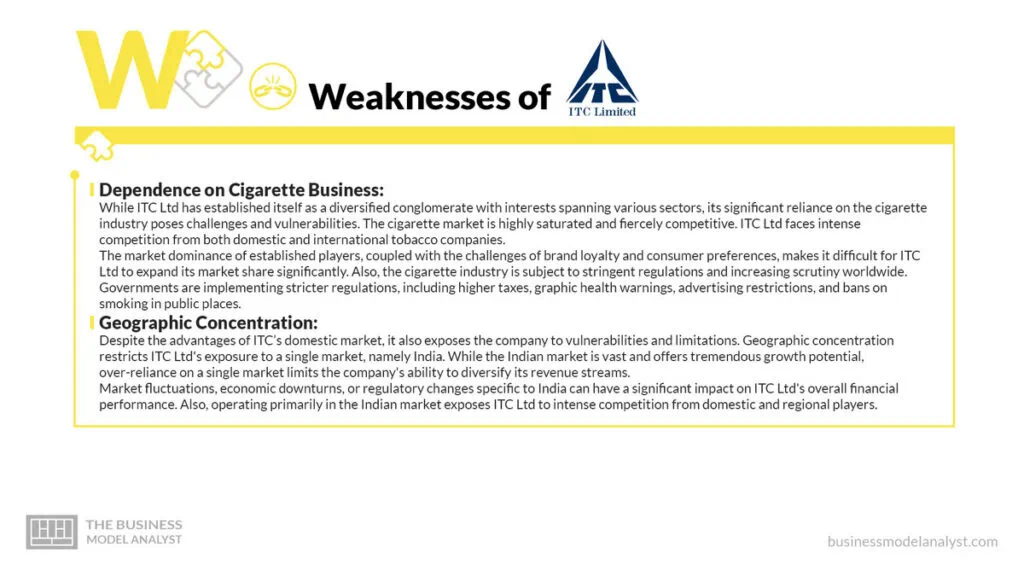
The following are the weaknesses that pose challenges to ITC’s growth and development:
- Dependence on Cigarette Business
While ITC Ltd has established itself as a diversified conglomerate with interests spanning various sectors, its significant reliance on the cigarette industry poses challenges and vulnerabilities. The cigarette market is highly saturated and fiercely competitive. ITC Ltd faces intense competition from both domestic and international tobacco companies.
The market dominance of established players, coupled with the challenges of brand loyalty and consumer preferences, makes it difficult for ITC Ltd to expand its market share significantly. Also, the cigarette industry is subject to stringent regulations and increasing scrutiny worldwide. Governments are implementing stricter regulations, including higher taxes, graphic health warnings, advertising restrictions, and bans on smoking in public places.
- Geographic Concentration
Despite the advantages of ITC’s domestic market, it also exposes the company to vulnerabilities and limitations. Geographic concentration restricts ITC Ltd’s exposure to a single market, namely India. While the Indian market is vast and offers tremendous growth potential, over-reliance on a single market limits the company’s ability to diversify its revenue streams.
Market fluctuations, economic downturns, or regulatory changes specific to India can have a significant impact on ITC Ltd’s overall financial performance. Also, operating primarily in the Indian market exposes ITC Ltd to intense competition from domestic and regional players.
- Slow Adoption of E-commerce
In an era marked by rapid digital transformation and changing consumer preferences, the slow adoption of e-commerce poses a serious challenge to ITC. The slow adoption of e-commerce means that ITC Ltd needs to fully tap into the potential revenue and growth opportunities offered by online retail channels. With the increasing popularity of online shopping, consumers are seeking convenience, broader product selections, and competitive pricing.
By not fully embracing e-commerce, ITC Ltd may miss out on a significant portion of the market and potential customers who prefer online purchasing. Also, by not actively participating in e-commerce, ITC Ltd risks falling behind in terms of industry trends and customer expectations.
- High Debt Levels
While ITC operates across diverse sectors and has achieved considerable success, its burden of substantial debt can hinder its growth potential and financial stability. High levels of debt restrict ITC Ltd’s financial flexibility and limit its ability to allocate resources efficiently. The company’s cash flow and profitability may be impacted by the need to service debt obligations, including interest payments and debt repayments.
This financial strain can constrain the company’s ability to pursue new growth opportunities, invest in research and development, undertake strategic acquisitions, or respond effectively to market fluctuations. In conclusion, ITC’s high debt levels lead to financial constraints, increased interest costs, limitations on capital expenditure, ratings downgrades, reduced investor confidence, and restricted strategic agility.
- Vulnerability to Commodity Price Volatility
ITC Ltd heavily relies on commodities as raw materials for its products; therefore, fluctuations in commodity prices can significantly impact the company’s profitability, supply chain, and overall financial performance. Commodity price volatility exposes ITC Ltd to cost pressures that can directly affect its profitability.
Sudden price increases in essential commodities used in manufacturing processes, such as agricultural products, metals, or energy sources, can lead to higher production costs. These increased costs may not be easily passed on to consumers, especially in competitive markets, resulting in squeezed profit margins. Also, commodity price volatility can disrupt ITC Ltd’s supply chain, leading to potential shortages or delays in raw material availability.
ITC Opportunities
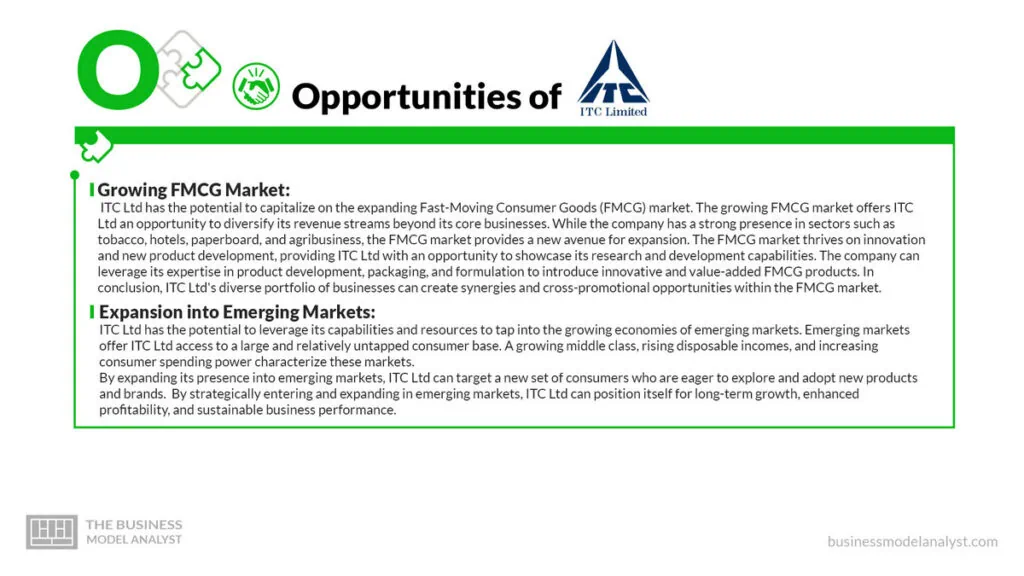
The following are opportunities for ITC’s growth and development:
- Growing FMCG Market
ITC Ltd has the potential to capitalize on the expanding Fast-Moving Consumer Goods (FMCG) market. The growing FMCG market offers ITC Ltd an opportunity to diversify its revenue streams beyond its core businesses. While the company has a strong presence in sectors such as tobacco, hotels, paperboard, and agribusiness, the FMCG market provides a new avenue for expansion. The FMCG market thrives on innovation and new product development, providing ITC Ltd with an opportunity to showcase its research and development capabilities. The company can leverage its expertise in product development, packaging, and formulation to introduce innovative and value-added FMCG products. In conclusion, ITC Ltd’s diverse portfolio of businesses can create synergies and cross-promotional opportunities within the FMCG market.
- Expansion into Emerging Markets
ITC Ltd has the potential to leverage its capabilities and resources to tap into the growing economies of emerging markets. Emerging markets offer ITC Ltd access to a large and relatively untapped consumer base. A growing middle class, rising disposable incomes, and increasing consumer spending power characterize these markets.
By expanding its presence into emerging markets, ITC Ltd can target a new set of consumers who are eager to explore and adopt new products and brands. By strategically entering and expanding in emerging markets, ITC Ltd can position itself for long-term growth, enhanced profitability, and sustainable business performance.
- Focus on Health and Wellness
ITC Ltd can leverage the growing consumer demand for health and wellness products and services. There is a global shift towards health consciousness, with consumers increasingly prioritizing their well-being and seeking healthier lifestyle choices. This presents a significant opportunity for ITC Ltd to align its product portfolio with the growing demand for health and wellness products.
By leveraging its existing resources, research and development capabilities, and consumer insights, ITC Ltd can introduce a range of health-focused products that cater to the evolving needs of health-conscious consumers. By aligning its business strategy with the health and wellness trend, ITC Ltd can capture market share, enhance consumer loyalty, and drive long-term growth.
- Acquisitions and partnerships
Through strategic acquisitions and partnerships, ITC can fuel its growth, expand its market presence, and enhance its competitive advantage. Acquisitions and partnerships offer ITC Ltd an opportunity to expand its market presence and diversify its business portfolio.
By acquiring businesses in related or complementary sectors, ITC Ltd can enter new markets, gain access to new customer segments, and broaden its product offerings. These strategic moves allow the company to reduce its reliance on specific sectors, mitigate risks associated with market fluctuations, and create a more balanced revenue stream.
- Adoption of E-commerce
The growing popularity of e-commerce platforms and other digital channels can help ITC to enhance its market reach, improve customer experience, and drive revenue growth. The adoption of e-commerce allows ITC Ltd to expand its customer reach beyond traditional brick-and-mortar stores.
By establishing a strong online presence, the company can tap into a larger customer base, including those who prefer the convenience of shopping online. E-commerce enables ITC Ltd to reach customers in remote areas, international markets, and underserved regions, thereby increasing its market penetration and potential revenue streams.
ITC Threat
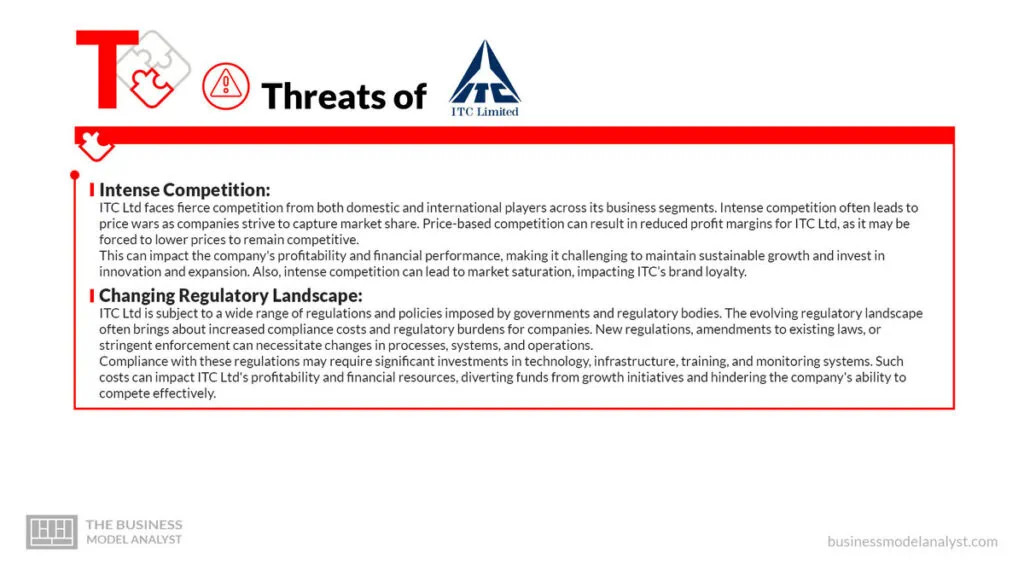
The following are some of the threats that ITC faces:
- Intense Competition
ITC Ltd faces fierce competition from both domestic and international players across its business segments. Intense competition often leads to price wars as companies strive to capture market share. Price-based competition can result in reduced profit margins for ITC Ltd, as it may be forced to lower prices to remain competitive.
This can impact the company’s profitability and financial performance, making it challenging to maintain sustainable growth and invest in innovation and expansion. Also, intense competition can lead to market saturation, impacting ITC’s brand loyalty.
- Changing Regulatory Landscape
ITC Ltd is subject to a wide range of regulations and policies imposed by governments and regulatory bodies. The evolving regulatory landscape often brings about increased compliance costs and regulatory burdens for companies. New regulations, amendments to existing laws, or stringent enforcement can necessitate changes in processes, systems, and operations.
Compliance with these regulations may require significant investments in technology, infrastructure, training, and monitoring systems. Such costs can impact ITC Ltd’s profitability and financial resources, diverting funds from growth initiatives and hindering the company’s ability to compete effectively.
- Rising Input Costs
ITC Ltd is reliant on various inputs such as raw materials, energy, labor, and other resources to produce its goods and services. Higher input costs can put ITC Ltd at a competitive disadvantage compared to its rivals. If competitors can procure inputs at lower costs, they may be able to offer products at more competitive prices, potentially capturing market share from ITC Ltd.
Also, rising input costs necessitate a focus on operational efficiency and cost management within ITC Ltd. Higher input costs can limit ITC Ltd’s ability to invest in innovation and research and development (R&D).
- Rapid Technological Advancements
ITC Ltd has existed for over a century and is now operating in an era of unprecedented technological disruption. Rapid technological advancements can render existing products and services obsolete. Also, it often comes with a significant cost of implementation, such as investing in new technologies, upgrading infrastructure, and training employees.
As new technologies emerge, customer preferences and demands change accordingly. ITC Ltd may face the challenge of maintaining the relevance and competitiveness of its offerings in the face of disruptive technologies.
Failure to keep pace with technological advancements can result in a loss of market share to more innovative competitors offering superior and technologically advanced products and services. Also, these rapid technological advancements can outpace existing regulatory frameworks.
- Environmental Factors
Despite being a diversified conglomerate operating in various sectors, ITC Ltd is subject to the growing scrutiny and impact of environmental issues. Environmental factors, including climate change and the increasing frequency and intensity of natural disasters, pose a threat to ITC Ltd. Climate change can lead to disruptions in the availability and quality of resources, affecting the company’s operations and supply chains.
Natural disasters such as floods, hurricanes, or droughts can damage infrastructure, interrupt production processes, and impact distribution networks. Negative publicity related to environmental damage, pollution incidents, or unsustainable practices can erode customer trust, investor confidence, and brand value.
In addition, environmental factors can disrupt global and domestic supply chains, impacting the availability and quality of inputs. For ITC Ltd, this can lead to challenges in sourcing sustainable and ethically produced raw materials, as well as disruptions in logistics and transportation.
Conclusion
In conclusion, ITC Ltd’s diverse portfolio, strong brand presence, and strong distribution network position it as a market leader in multiple sectors. However, weaknesses such as heavy dependence on the tobacco business and limited international presence warrant attention. To navigate the dynamic business landscape and position itself for sustainable growth and success in the future, ITC has to leverage its strengths, address its weaknesses, capitalize on opportunities, and mitigate threats.


